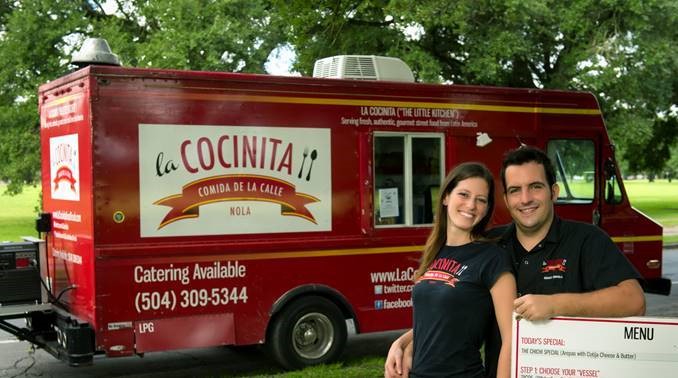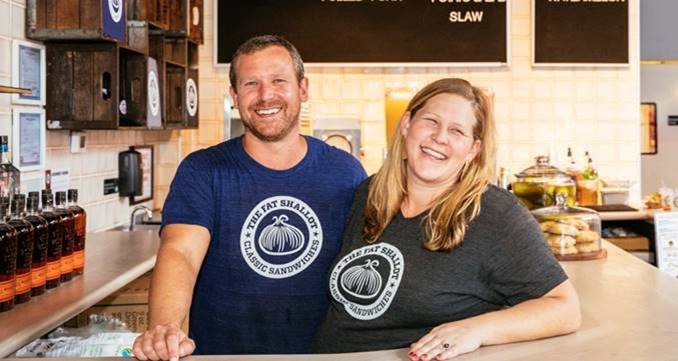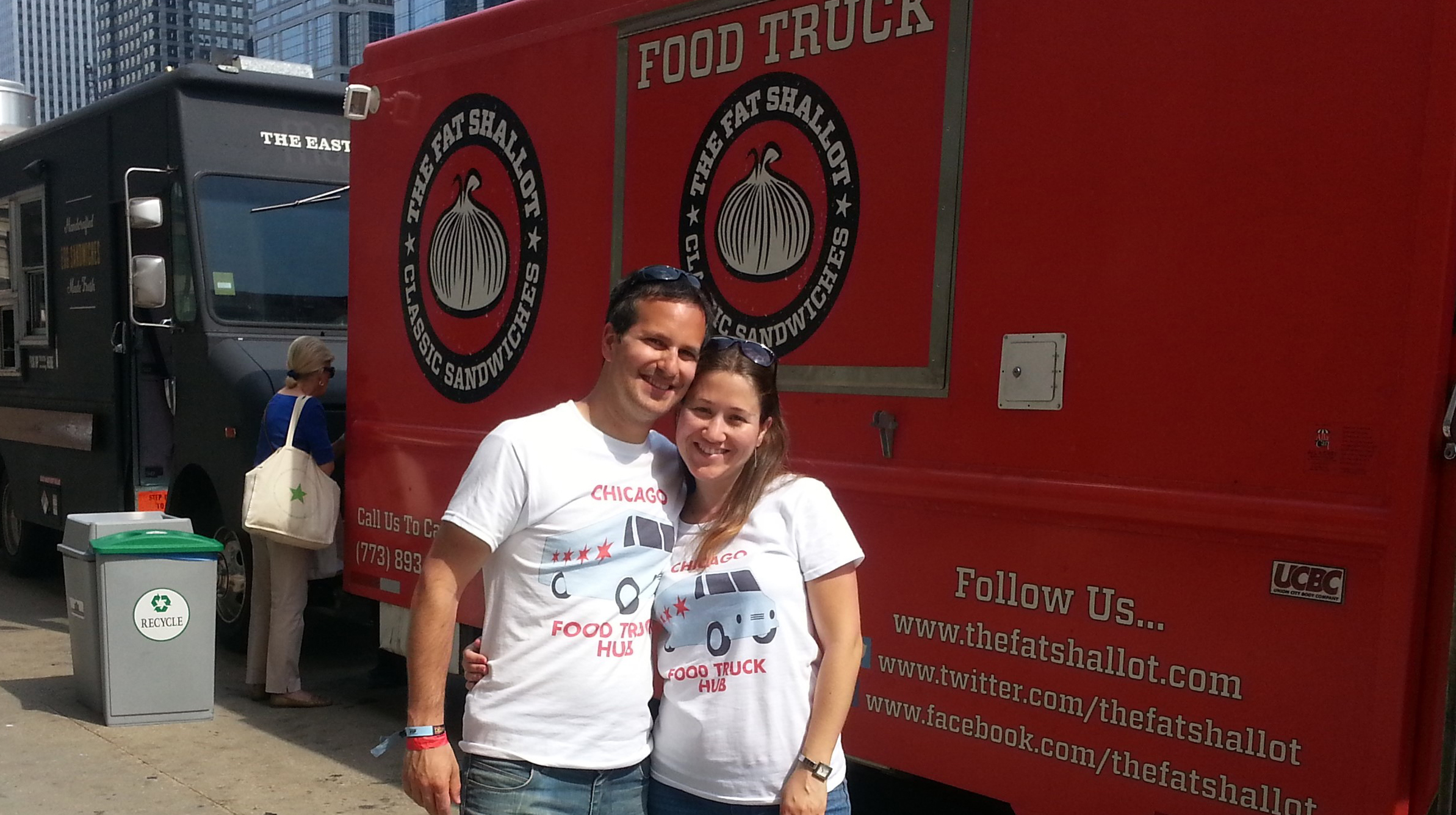It Started in the Chadar Ochel
by Jared Skoff
When Rachel Angulo (Rachel Billow, Nivonim 1997) and her husband, chef Benoit Angulo, first hatched the plan to start a food truck, their goal was to extend the importance of hospitality and customer service from a five-star restaurant to a cafe on wheels. “Our idea was – it doesn’t matter if you’re in a casual location or a fine dining establishment,” Rachel explains, “you can make the same dining memories for your guests.”
The first La Cocinita (“little kitchen”) opened in 2011, serving classic Venezuelan street food. Rachel and Benoit now operate food trucks in New Orleans and Chicago, as well as a food stall in the Pythian Market in New Orleans and a full-scale restaurant in Evanston, IL.
Rachel and her older brother Jamie both started as Ramah campers in 1992. Their father was a Ramah Wisconsin camper in the early 1960’s, and was adamant that they attend. “At the time I was going to a different summer camp and I had my friends there, so I agreed to try Ramah on the condition that I could choose my camp the following summer,” Rachel remembers. “After 4 weeks in Halutzim, I chose Ramah and never looked back. My decision was a huge testament to the friendships I built at Ramah that first summer, friendships that have continued for the past 27 years.”
Beyond friendship, Rachel credits Ramah with her first exposure to large-scale food supply shipments and problem-solving in the kitchen. “When I was in Shoafim, we once ran out of jelly in the chadar ochel, and everyone was making such a fuss about the Sysco order,” Rachel said. It was a crisis, and she had to make do with other substitutes. “We now get a weekly food delivery from Sysco, and I always laugh to myself – whenever the Sysco truck pulls in I think about my Shoafim summer.”
Ramah has also become a network within the food truck community. When Sarah Weitz (Nivonim 1998) wanted to start her own food truck business, she called Rachel. They had originally met at Ramah, and became closer friends through a Jewish Newcomers program while both living in New Orleans. “My husband and I were so inspired that we came down to work on her truck,” Sarah said. Sarah and her husband, Sam Barron, met while studying in culinary school, and were planning to open a food truck in Chicago. In 2012, after their weeklong trial working at La Cocinita, they opened up their own truck, The Fat Shallot, in Chicago. From the start, it was a huge success. “We started our truck immediately after Chicago passed a law allowing cooking on food trucks; we were #5 in the entire city. We sold out within one hour on our first day.” The Fat Shallot serves classic sandwiches with a gourmet twist, and now operates on two food trucks, a stall at the Revival Food Hall, and as of 6 months ago, a brick-and-mortar restaurant.
Sarah’s Ramah connections continue to be a presence in her life, as well. “Ramah is always a thought in my head,” she said, “it was such a wonderful experience in my life, and I built very strong friendships with people who continue to be important to me. Ramah friends continue to hire us for events. I also went to Ramah with Jacob Shapiro (Nivonim 1998), who we hired to build our restaurant. No one can fully understand the connection I have with my fellow Ramahniks.”
Rachel Angulo’s brother, Jamie Billow (Nivonim 1995), has also found his way into the food truck business. As head of the Chicago Food Truck Hub, Jamie focuses on “food truck and event management with a unique flair.” When a client hires him for an event, he looks for the right food truck partner that is in line with the budget and interests of the client.
In expanding and growing his business, Jamie’s work has brought him back to Ramah. “I am now working with one of my best friends from camp, Lee Lampert (Nivonim 1995), who is helping us grow our business. We were cabin mates in the ‘90s!” Jamie said.
Jamie remembers his Ramah peers and his counselors being a major influence on him growing up. Ramah was also the place where he fostered a serious connection to Israel. “Ramah Israel Seminar was an amazing experience for me as a teen, to be with my best friends in Israel,” Jamie said. “At Ramah Wisconsin I always spent time with our Israeli counselors, whether it was learning Hebrew language and songs, or making friendships that carried into adulthood. I am still in touch with my Israeli counselors to this day.” Ultimately, Jamie had the opportunity to lead an MBA trip to Israel while attending business school, and after earning his MBA, he made aliyah. “I met my wife, Rinat, in Israel and worked there before returning to Chicago. I have maintained a strong connection to Israel from my time as a child until today.”
Upon reflecting on his event management business, Jamie sees a strong connection to his learnings at Ramah. “In our work, we are focused on providing the best customer service, and doing right by the people we serve,” Jamie explains. “That is something we can trace back our lessons learned at Ramah.”
Lisa Kornick (Lisa Koch, Nivonim 1981) is another Ramah alum bringing a values-based philosophy into her work in the restaurant industry, and beyond. Working alongside her husband, chef Michael Kornick, Lisa managed their flagship restaurant, mk, for 18 years, and their restaurant business has now grown to 8 restaurants, with additional projects in the pipeline. “A formula for success is investing in all of our people and making everyone feel appreciated,” Lisa explains. “I have the same benefits and vacation package as my dishwasher. We have very happy employees who have longevity with our company.”
Lisa’s newest venture applies these fundamental values to a financial institution – the First Women’s Bank of Chicago. This bank will be the first in the nation owned and operated entirely on women’s capital. “I would love to build a bank that focuses on women entrepreneurs and has a hospitality influence, assisting women in developing a robust business network, and providing financial education for women,” Lisa says. “My dream is to show that financial institutions can be profitable and also have enlightened policies.”
When Lisa started at Ramah in the ‘70s, her parents sent her for two important reasons: her best friend went to Ramah, and the Northwoods was presumed a better environment for her seasonal allergies. The eldest in her family, Lisa had such a great experience at Ramah that her younger sister, brother, and mother ultimately spent summers at camp. Lisa quickly made lifelong friends. “We have all remained friends to this day – the same girls I was in a cabin with since that first summer in Shoafim,” she said. The community feeling of Shabbat dinner at camp continues to come back to her as well. “A lot of my Ramah friends go to shul with me. We have Friday night services, eat dinner together after, and bench like we did at Ramah. It is something I really love and look forward to.”
As a restaurateur and leader in business, these Ramah dining memories continue to impact Lisa’s community approach to the workplace. “What I love about Camp Ramah is that it is a values-based organization,” Lisa explains. “Ramah is a community with values that prioritizes aligning its business values with its religious values. This philosophy is very important to us in our work.”









